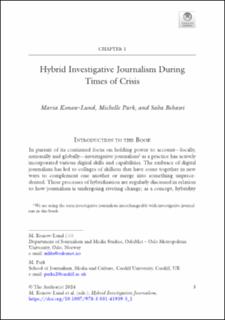Hybrid Investigative Journalism During Times of Crisis
| dc.contributor.author | Konow Lund, Maria | |
| dc.contributor.author | Park, Michelle | |
| dc.contributor.author | Bebawi, Saba | |
| dc.date.accessioned | 2024-02-01T11:39:48Z | |
| dc.date.available | 2024-02-01T11:39:48Z | |
| dc.date.created | 2024-01-19T17:23:21Z | |
| dc.date.issued | 2023 | |
| dc.identifier.isbn | 978-3-031-41938-6 | |
| dc.identifier.uri | https://hdl.handle.net/11250/3115048 | |
| dc.description.abstract | In pursuit of its continued focus on holding power to account—locally, nationally and globally—investigative journalism as a practice has actively incorporated various digital skills and capabilities. The embrace of digital journalism has led to collages of skillsets that have come together in new ways to complement one another or merge into something unprecedented. These processes of hybridisation are regularly discussed in relation to how journalism is undergoing riveting change; as a concept, hybridity challenges traditional notions of how journalism is being produced and by whom. Domingo (2016, p. 145), for example, points out that hybridisation is taking place within journalistic practices both overtly and covertly amongst a range of (new and traditional) actors, platforms and organisations. The hybrid combination of digital and traditional physical forms of journalistic collaboration has also given rise to new horizontal processes (Russel, 2016, p. 149). | en_US |
| dc.language.iso | eng | en_US |
| dc.relation.ispartof | Hybrid Investigative Journalism | |
| dc.rights | Navngivelse 4.0 Internasjonal | * |
| dc.rights.uri | http://creativecommons.org/licenses/by/4.0/deed.no | * |
| dc.title | Hybrid Investigative Journalism During Times of Crisis | en_US |
| dc.type | Chapter | en_US |
| dc.description.version | publishedVersion | en_US |
| cristin.ispublished | true | |
| cristin.fulltext | original | |
| cristin.qualitycode | 2 | |
| dc.identifier.cristin | 2230883 | |
| dc.source.pagenumber | 3-22 | en_US |
Tilhørende fil(er)
Denne innførselen finnes i følgende samling(er)
-
Publikasjoner fra Cristin [3269]
-
SAM - Institutt for journalistikk og mediefag [337]
SAM - Department of Journalism and Media Studies

